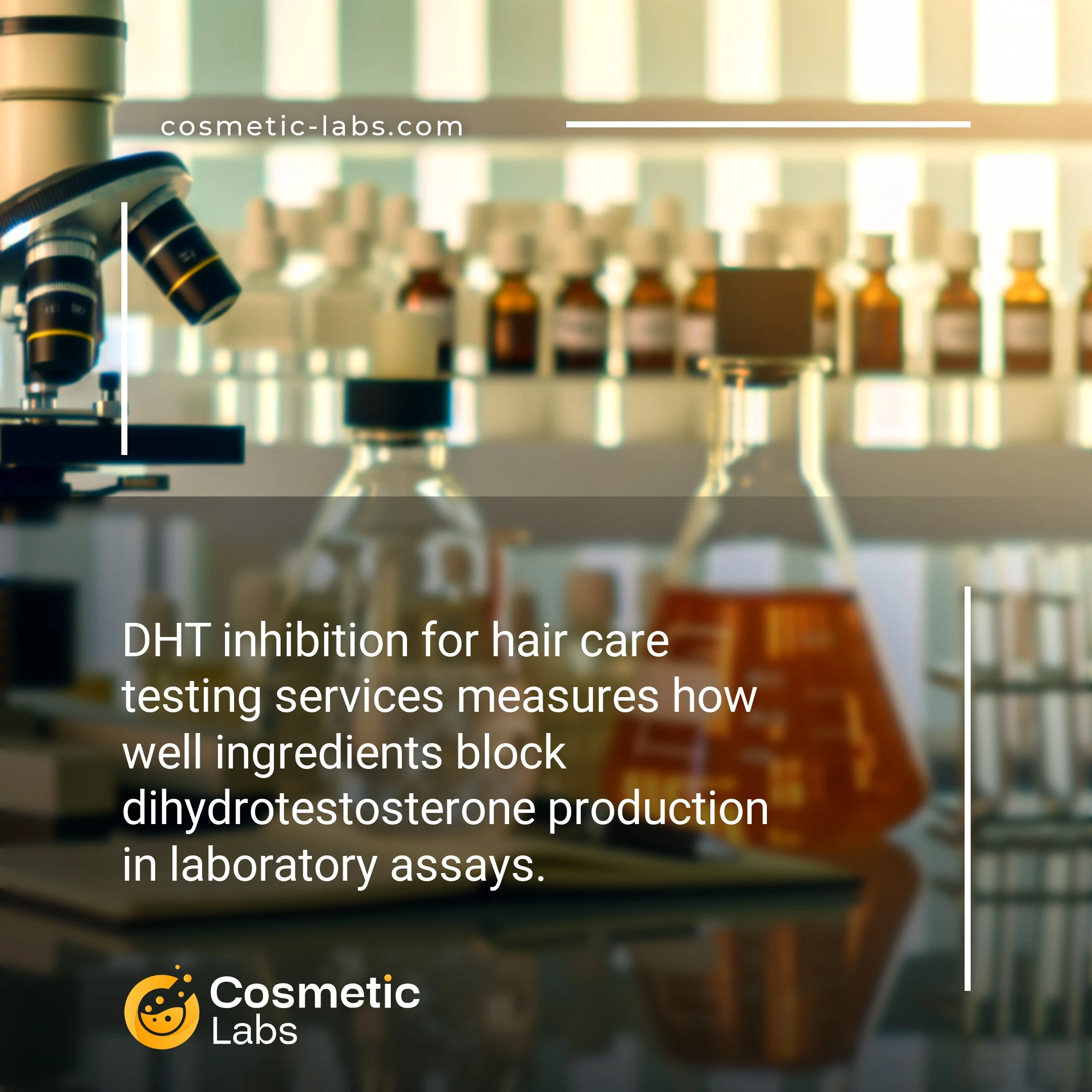DHT Inhibition Testing Services for Hair Care Products

What is DHT inhibition?
DHT inhibition hair care testing services measure how effectively formulations block dihydrotestosterone, the hormone responsible for androgenetic alopecia. Labs use in vitro enzyme assays to test ingredients like saw palmetto and finasteride against 5-alpha reductase activity, providing quantifiable data on potency levels. These preclinical studies help brands validate anti-hair loss claims before market launch.
Why do you need this service?
Hair care brands use DHT inhibition testing to validate anti-hair loss shampoos, serums, and scalp treatments before market launch. Labs measure how effectively your formulations block dihydrotestosterone activity through follicle assays and hormone binding studies, delivering quantifiable proof that supports product claims and regulatory submissions within 4-6 weeks.
Who provides DHT inhibition services?
All cosmetic labs providing DHT inhibition services
There is no company providing these services at the moment.
DHT Inhibition Testing for Hair Care Products
Professional labs offer DHT inhibition testing services to validate your hair care formulations’ ability to block dihydrotestosterone, the primary hormone responsible for androgenic alopecia. These specialized assays measure how effectively your active ingredients prevent DHT production or receptor binding, providing the scientific data needed to support anti-hair loss claims.
In Vitro DHT Enzyme Inhibition Assays
Labs run 5α-reductase inhibition tests using purified enzymes to measure your ingredients’ ability to block DHT synthesis. The standard protocol tests both Type I and Type II isoforms at multiple concentrations.
Testing parameters include:
- IC50 values for dose-response curves
- Enzyme kinetics analysis
- Competitive vs. non-competitive inhibition modes
- Stability testing under physiological conditions
Results provide quantitative data on potency compared to reference compounds like finasteride, helping you optimize formulation concentrations for maximum efficacy.
Cell-Based DHT Receptor Binding Studies
Advanced testing facilities use human dermal papilla cells and follicle cultures to evaluate DHT receptor antagonism. These assays measure how your ingredients interfere with androgen receptor activation in hair follicle cells.
Key measurements include:
- Receptor binding affinity (Ki values)
- Gene expression changes in DHT-responsive pathways
- Cell viability and proliferation rates
- Cytotoxicity screening at effective concentrations
This cellular approach provides more physiologically relevant data than enzyme-only tests, showing how your formulation performs in conditions that mirror the scalp environment. Contact labs on our platform to discuss DHT inhibition testing protocols tailored to your specific hair care product development needs.
Practical Applications of DHT Inhibition Testing for Hair Care Products
Cosmetic labs provide DHT inhibition testing services to validate anti-hair loss claims and support product development across multiple hair care categories.
Anti-Hair Loss Product Development
Labs test botanical extracts, peptides, and synthetic compounds for their ability to block 5α-reductase enzyme activity. Testing protocols measure DHT reduction percentages at various concentrations, typically ranging from 0.1% to 5% active ingredient levels. In vitro assays provide quantitative data within 7-14 days, allowing formulators to optimize ingredient ratios before clinical trials.
Common test subjects include saw palmetto extract, caffeine, adenosine, and proprietary peptide complexes. Results guide formulation decisions for shampoos, serums, and scalp treatments targeting androgenetic alopecia.
Regulatory Support and Claims Substantiation
Testing services generate documentation required for marketing claims about hair growth stimulation and follicle protection. Labs conduct dose-response studies to establish minimum effective concentrations and safety thresholds. Standardized protocols ensure reproducible results that meet regulatory requirements across different markets.
Documentation includes IC50 values, enzyme kinetics data, and comparative analysis against reference compounds like finasteride. This data supports product registration and advertising claims verification.
| Testing Method | Timeline | Data Output | Application |
|---|---|---|---|
| 5α-Reductase Inhibition Assay | 5-7 days | IC50 values, % inhibition | Ingredient screening |
| Enzyme Kinetics Analysis | 10-14 days | Km, Vmax parameters | Mechanism study |
| Dose-Response Testing | 14-21 days | Concentration curves | Formulation optimization |
| Comparative Analysis | 7-10 days | Relative potency | Competitive benchmarking |
Ready to validate your hair care formulations? Contact specialized labs on our platform to discuss DHT inhibition testing protocols tailored to your product development needs.
